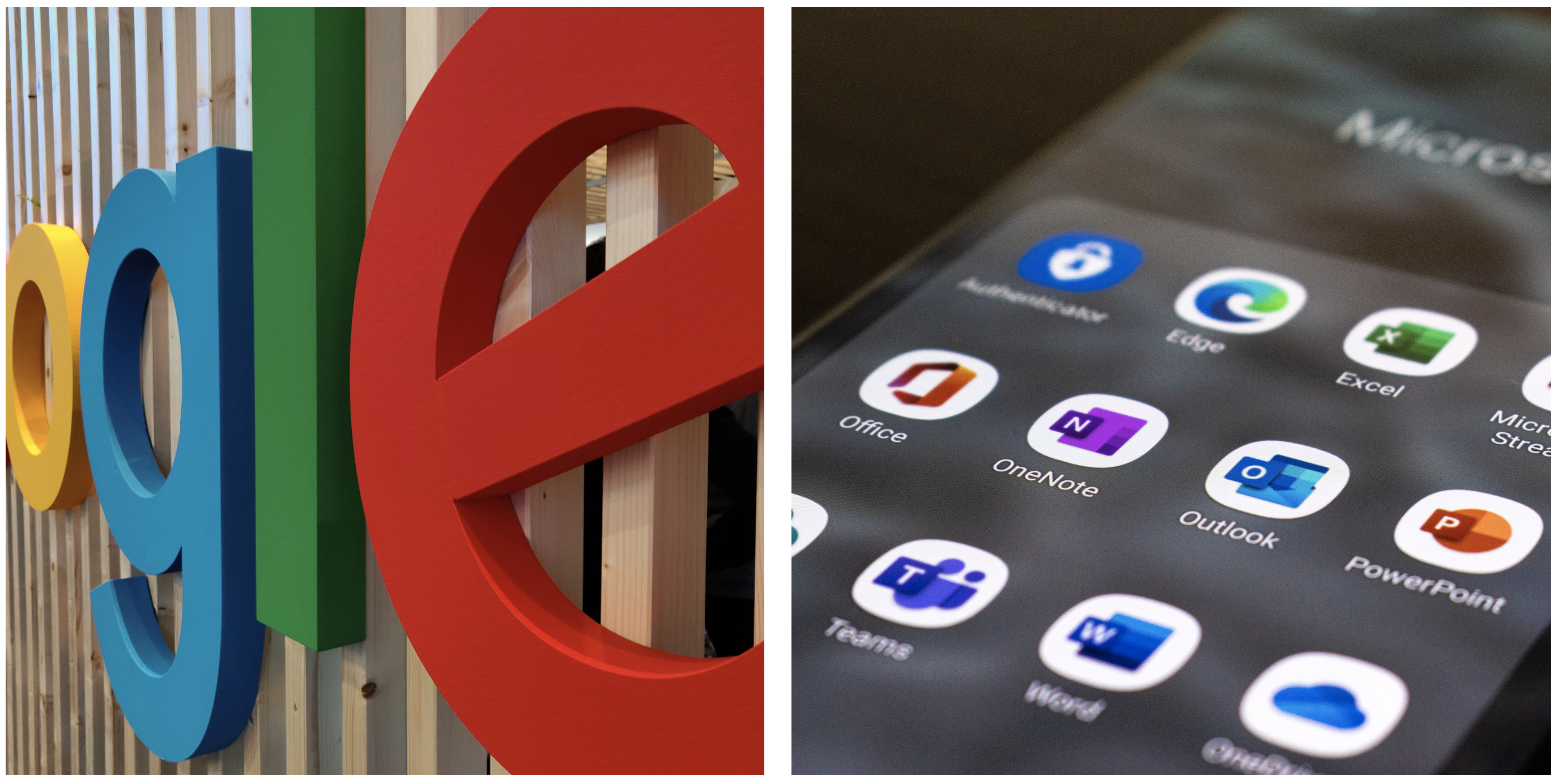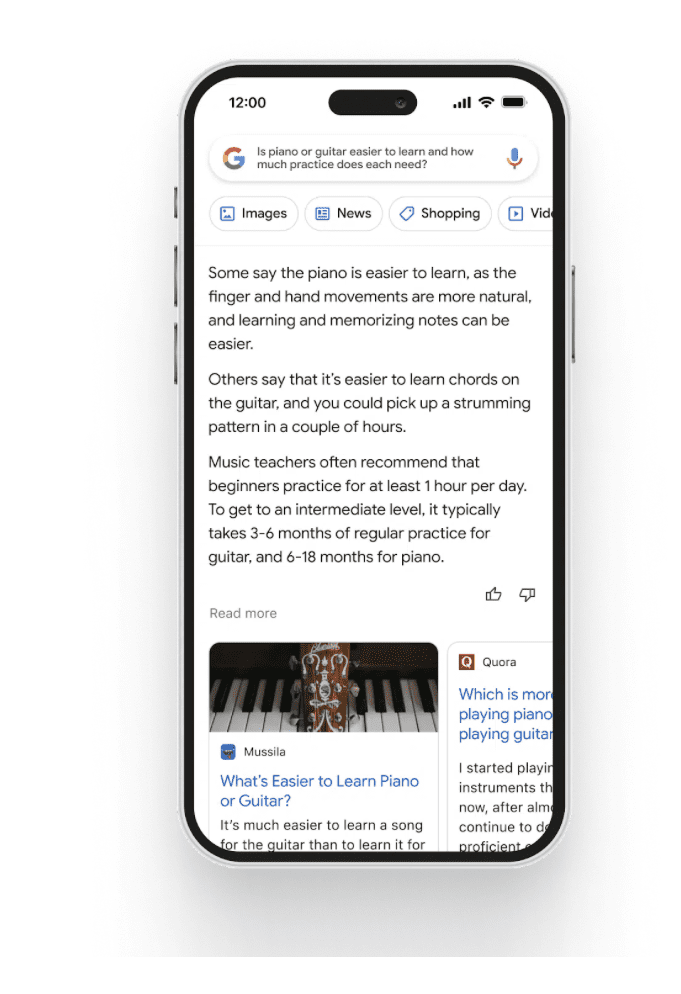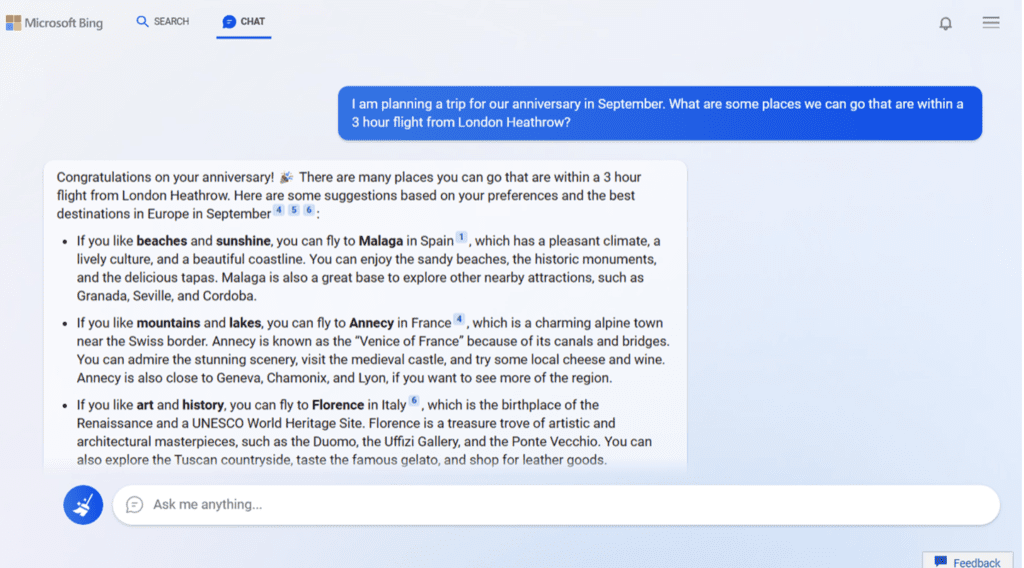On our blog, we speculated that Google would launch its own conversational AI assistant for search as a response to the popularity of ChatGPT. Well, within hours, we had our answer, and then some: not only did Google launch a new conversational AI tool for search — so did Microsoft.
What Google Announced
On February 6, Sundar Pichai, CEO of Google and its parent company Alphabet, announced the launch of Bard, which he characterized as an experimental conversational AI service. Importantly, though, Pichai was careful to qualify how Google is moving forward. Instead of dropping the tool publicly as OpenAI did, Google is making Bard available to a team of “trusted testers” before making the tool publicly available “in coming weeks.”
This is a big difference in approach from OpenAI. Essentially Pichai was signaling, “We’re Google. We’re not going to risk our brand’s reputation by rushing something to the market until it’s ready.” By contrast, OpenAI made it clear that the company was going to crowdsource feedback from the public and make ChatGPT better – the “get to the market fast with an imperfect solution and make it better” approach that typifies Silicon Valley start-ups.
Google left start-up mode a long, long time ago.
According to Search Engine Land, the “trusted testers” vetting Bard are a demographically and geographically diverse group of people external to Google — an important consideration clearly designed to mitigate against bias – and bias is a problem that has vexed ChatGPT.
Bard is going to function as ChatGPT does now: synthesizing information to provide more complete, contextual responses to queries the way voice search has always promised to do. In Pichai’s words:
Bard can be an outlet for creativity, and a launchpad for curiosity, helping you to explain new discoveries from NASA’s James Webb Space Telescope to a 9-year-old, or learn more about the best strikers in football right now, and then get drills to build your skills . . . When people think of Google, they often think of turning to us for quick factual answers, like “how many keys does a piano have?” But increasingly, people are turning to Google for deeper insights and understanding — like, “is the piano or guitar easier to learn, and how much practice does each need?” Learning about a topic like this can take a lot of effort to figure out what you really need to know, and people often want to explore a diverse range of opinions or perspective.
And, he added that Bard will be incorporated into Google Search soon. Here’s a screen shot of how the interface might look, courtesy of Google:
This is quite an announcement, to be sure. As we blogged, it was known that Google had been developing conversational AI technology for quite some time – but the company was not ready to take it public. However, as a result, OpenAI was enjoying all the glory and credit for ChatGPT’s remarkable conversational abilities. On top of that, Microsoft invested billions of dollars into OpenAI and was reportedly incorporating ChatGPT into Bing Search.
Microsoft Drops an AI Bomb
And, speaking of Microsoft: on February 7, the company confirmed that indeed conversational AI was coming to Bing Search — not based on ChatGPT exactly, but a more powerful form of the tool. Microsoft shared a new version Bing, powered by an upgraded version of the same AI technology that underpins chatbot ChatGPT. The company is launching the product alongside an upgraded version of its Edge browser. This means that that the two will provide a new experience for browsing the web and finding information online.
The “new Bing” (in Microsoft’s words) offers a chat function, where users can ask questions and receive answers from the latest version AI language model built by OpenAI. Users can also create itineraries for trips. So, for example, you can ask it to “Plan a five-day trip to Mexico.” It’s available in preview mode at Bing.com.
Following the announcement, Yusuf Mehdi, Microsoft Corporate Vice President & Consumer Chief Marketing Officer, shared more detail on the Microsoft blog. Among other things, he elaborated on how Bing’s chat functionality can help with ideation, whether writing content or planning something:
There are times when you need more than an answer – you need inspiration. The new Bing can generate the content to help you. It can help you write an email, create a 5-day itinerary for a dream vacation to Hawaii, with links to book your travel and accommodations, prep for a job interview or create a quiz for trivia night. The new Bing also cites all its sources, so you’re able to see links to the web content it references.
Here is a depiction of the experience from the post:
He also elaborated on how the Edge browser is being improved with AI, via chat and compose. With the Edge Sidebar, you can ask for a summary of a lengthy financial report to get the key takeaways – and then use the chat function to ask for a comparison to a competing company’s financials and automatically put it in a table. You can also ask Edge to help you compose content, such as a LinkedIn post, by giving it a few prompts to get you started. After that, you can ask it to help you update the tone, format and length of the post. Edge can understand the web page you’re on and adapts accordingly.
As we learn more about Microsoft’s announcement, we’ll share more.
Many questions remain, such as:
- Whether a conversational AI will actually improve the search experience given nagging problems with providing wrong answers and biased information. As The Verge noted, “AI language systems like ChatGPT have a well-documented propensity for presenting false information as fact.”
- How Google and Microsoft will incorporate conversational AI into Search without harming their core advertising business. As noted, conversational AI tools flourish by giving searchers concise responses instead of links to other sites. Google’s ad model depends on people staying engaged on Google Search clicking on links. Microsoft’s ad business, though nowhere near the size of Google’s, also depends on clicks and engagement.
For now, we suggest that businesses watch the developments closely and experiment with conversational AI. No doubt Google and Microsoft will provide more context on how the interplay with their ads will work. At True Interactive, we are staying in close contact with Google and Microsoft and will report developments as we learn about them.
Don’t change your ad strategy. We’re in early days.
Contact True Interactive
To succeed with online advertising, contact True Interactive. Read about some of our client work here.


